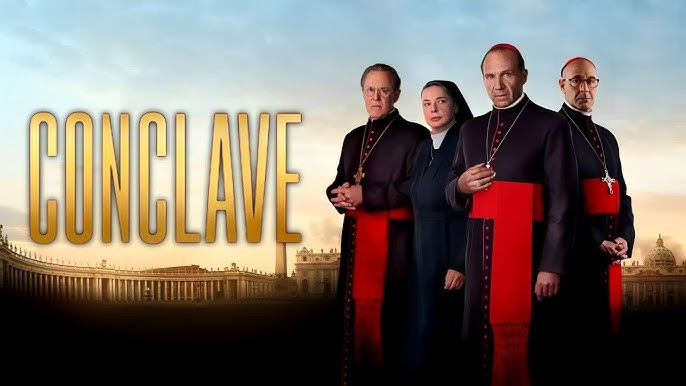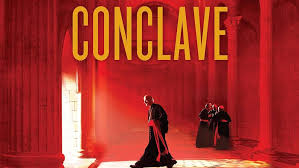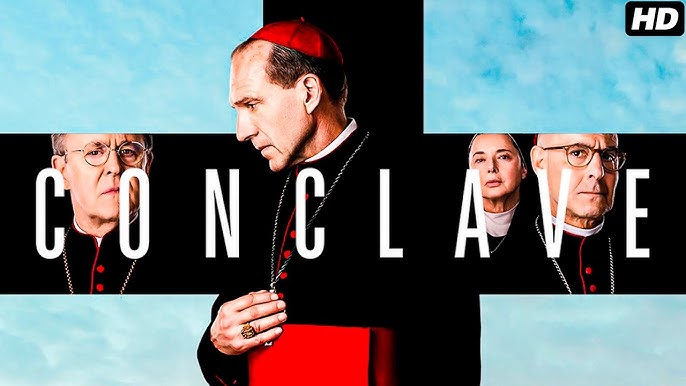🎬 Conclave (2024)

🎬🎬 Conclave | 2024 | Starring Ralph Fiennes, John Lithgow, Stanley Tucci, Isabella Rossellini
Movie Synopsis:
Conclave (2024) is a tense political drama set within the sacred and secretive walls of the Vatican, adapted from the critically acclaimed novel by Robert Harris. Directed by Edward Berger (All Quiet on the Western Front), the film delves into the high-stakes intrigue and moral dilemmas of a papal election after the sudden death of the Pope. The story unfolds from the perspective of Cardinal Lomeli (Ralph Fiennes), the Dean of the College of Cardinals, tasked with overseeing the conclave—a centuries-old ritual where cardinals gather to elect a new pope.
As 117 cardinals convene in the Sistine Chapel, alliances are forged, secrets are exposed, and power struggles emerge. Tensions rise when an enigmatic late arrival, Cardinal Benitez (Stanley Tucci), threatens to upend the process, bringing shocking revelations about the church’s hierarchy. Lomeli, caught between his faith and the political machinations of his peers, must navigate this treacherous landscape to ensure the election proceeds with integrity.
The film’s gripping narrative explores themes of morality, faith, and corruption, offering a rare glimpse into the opaque world of Vatican politics. With its compelling characters and sharp dialogue, Conclave is both a fascinating character study and a reflection on the fragile balance between tradition and progress.
Key Themes and Narrative Depth
Faith vs. Power:
At its core, Conclave examines the collision between faith and ambition. While the cardinals outwardly present themselves as humble servants of God, many are driven by personal agendas. The film explores how power can corrupt even the holiest of individuals, raising questions about the true nature of leadership within the church.
Morality and Secrets:
Lomeli’s journey is one of moral reckoning. As he uncovers hidden scandals and manipulations among the cardinals, he grapples with his own role in an institution fraught with hypocrisy. This internal struggle mirrors the external battle for control, creating a layered narrative that keeps viewers engaged.
The Weight of Tradition:
The conclave’s rituals, steeped in centuries of tradition, serve as both a backdrop and a character in the film. From the ceremonial burning of ballots to the isolation of the cardinals, these customs add an air of gravitas and suspense while highlighting the tension between preserving tradition and embracing reform.
Performances: A Stellar Cast
Ralph Fiennes as Cardinal Lomeli:
Fiennes delivers a masterclass in restrained emotion, portraying Lomeli as a man torn between duty and doubt. His nuanced performance captures the character’s quiet dignity and inner turmoil, making Lomeli a compelling protagonist whose moral integrity anchors the film.
Stanley Tucci as Cardinal Benitez:
Tucci shines as the enigmatic Cardinal Benitez, whose arrival disrupts the conclave with unexpected revelations. His charisma and sharp delivery add an edge of unpredictability to the narrative, making him a standout presence in an already impressive ensemble.
John Lithgow as Cardinal Bellini:
Lithgow brings gravitas and complexity to his role as Cardinal Bellini, a conservative voice within the conclave. His clashes with more progressive cardinals provide some of the film’s most thought-provoking moments, as he embodies the institutional resistance to change.
Isabella Rossellini as Sister Agnes:
Rossellini’s brief but impactful role as Sister Agnes, a confidant to Lomeli, adds an emotional layer to the story. Her quiet strength and wisdom offer a counterbalance to the political scheming of the cardinals.
Direction and Visuals
Edward Berger’s direction is meticulous, creating an atmosphere of claustrophobic intensity within the confines of the Sistine Chapel. The film’s visual style emphasizes the grandeur and solemnity of its setting, with sweeping shots of Vatican City contrasted by intimate close-ups that capture the characters’ inner conflicts.
The production design deserves special mention for its attention to detail, faithfully recreating the opulence of the Vatican while imbuing it with a sense of foreboding. The Sistine Chapel, with its iconic frescoes, serves as a hauntingly beautiful backdrop to the cardinals’ deliberations.
Pacing and Tension
While Conclave is primarily a dialogue-driven drama, it maintains a steady pace through its sharp writing and carefully crafted tension. Each revelation and interaction feels deliberate, building toward a climactic vote that will determine not just the next pope, but the future of the church.
The film’s climax, a dramatic vote marred by unexpected events, keeps audiences on the edge of their seats, blending political intrigue with emotional resonance. Berger masterfully balances these elements, ensuring that the narrative remains engaging even during quieter moments.
Themes in the Modern Context
While set within the timeless rituals of the Vatican, Conclave feels timely in its exploration of leadership, corruption, and the challenge of reforming deeply entrenched institutions. The film subtly parallels contemporary issues of power and accountability, making it resonate beyond its ecclesiastical setting.
Box Office and Reception
Conclave is poised to be both a critical and commercial success, appealing to audiences who enjoy character-driven dramas with complex moral dilemmas. With its powerhouse cast and compelling narrative, early projections estimate the film will gross upwards of $150 million worldwide, bolstered by strong awards-season buzz.
Final Verdict
Conclave is a thought-provoking and visually stunning exploration of faith, power, and morality. Anchored by Ralph Fiennes’ commanding performance and Edward Berger’s precise direction, the film offers a gripping narrative that delves into the human flaws within a sacred institution. Whether you’re drawn to its political intrigue or its emotional depth, Conclave is a cinematic experience that lingers long after the credits roll.
Rating: ★★★★½☆ (4.5/5)